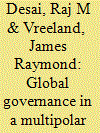| Srl | Item |
| 1 |
ID:
103257


|
|
|
|
|
| Publication |
2011.
|
| Summary/Abstract |
The reform of global financial governance is long overdue. Recent changes to the governance of the International Monetary Fund partially address the lack of representation of emerging market countries, but not their loss of confidence in the institution. In the meantime, alternative and perhaps better approaches to the problems of open economics are being proposed at a regional level. We describe these regional monetary funds and discuss their prospects. We conclude that because economic interdependence is strongest at the regional level, regional cooperation seems well-suited to a multipolar world.
|
|
|
|
|
|
|
|
|
|
|
|
|
|
|
|
| 2 |
ID:
161425


|
|
|
|
|
| Summary/Abstract |
Although private foreign aid has expanded dramatically in recent years, we still lack detailed information on the allocation of those private aid flows. We use a novel approach to examine the funding decisions of individuals with respect to international development assistance. We analyze the speed at which requests from microentrepreneurs in developing countries are fulfilled through a US-based Internet organization that bundles individual contributions and transfers them as interest-free loans to developing countries. Survival analysis finds little evidence for the expectation that private donors behave as rational aid givers, nor do we see private funders mimicking the behaviors of official aid agencies. Rather, private microloans seem principally influenced by humanitarian crises, along with the presence of migrant and diaspora networks from recipient countries. We conclude that international private aid is shaped by social linkages between individual donors and recipients. It can therefore fund areas neglected by traditional foreign aid. As a result, private foreign aid serves, in at least some cases, as a complement to official development assistance.
|
|
|
|
|
|
|
|
|
|
|
|
|
|
|
|